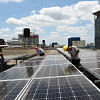Unlocking Bangladesh's renewable energy potential

Bangladesh faces multifaceted challenges towards transitioning to renewable energy. The nation's emerging economy demands energy for development, and the government has expressed the desire to achieve 40 percent of it from clean energy sources by 2041.
Bangladesh's limited land availability poses a significant challenge for large-scale renewable projects. In the most ambitious scenario, Bangladesh's draft national solar energy action plan calls for around 41GW of solar power by 2041. Additionally, the country needs more local capacity to develop and apply renewable technologies and formulate relevant policies.
Furthermore, the rapid transition to intermittent renewables and the increasing energy demand strain the existing energy grid, demanding innovative solutions. Bangladesh needs collective efforts of businesses, government bodies, and civil society. Each stakeholder is vital in driving renewable energy adoption and ensuring its success. These stakeholders should prioritise deploying renewable energy technologies and strive to increase energy access and security. In addition, energy storage solutions should be implemented to maximise the use of renewable energy and reduce dependence on traditional energy sources.
Foreign private investment presents significant opportunities for Bangladesh's renewable energy sector, including a US-based firm that has expressed interest in investing in solar power projects in the country. This could help Bangladesh increase its renewable energy production, reduce its dependence on fossil fuels, and reduce its environmental impact. It could also create jobs and attract additional investments, boosting the country's economy. Such investments can contribute to the country's renewable energy ambitions while fostering economic growth and collaboration between the two nations.
Efforts should be made to explore innovative ways to utilise the COP27-pledged Loss and Damage Fund, reduce emissions by 45 percent by 2030, and reach net zero by 2050, as called for in the Paris Agreement. This fund can be crucial in accelerating the energy transition by promoting the transfer and deployment of renewable technologies in developing countries like Bangladesh. This fund can also create new economic opportunities and jobs in clean energy. It can also be used to help vulnerable communities adapt to the impacts of climate change. Finally, it can fund research and development of new climate change mitigation and adaptation technologies.
Bangladesh possesses substantial potential for renewable energy deployment. It is estimated that nearly 7,500MW of solar power can be rapidly added to the energy mix if adequate funding mechanisms, such as green bonds, are arranged. Developing capacity through public-private partnerships and emphasising green finance is essential in realising this potential.
International partnerships for regional energy growth is a key factor. The US companies that are already present in Bangladesh, like GE and Chevron, could build a private sector ecosystem in Bangladesh. However, regulatory clarity is vital to attract private investment and ensure the long-term sustainability of such initiatives.
Balancing market and policy mechanisms is crucial for a successful energy transition. Rising energy prices have heightened public awareness and increased pressure on governments to take action. However, it is important to ensure investor confidence and address high renewable energy prices through market-based mechanisms where appropriate.
The energy sector in South Asia has been limited by a mindset that hampers international collaboration. Overcoming these barriers and fostering collaborative partnerships is crucial. Bangladesh has led cross-border electricity trade and calls for deeper cooperation to expand these flows further. The Asian Development Bank (ADB) recognises the potential for partnerships between the public and private sectors and advocates for their exploration.
There are various recommendations about future steps across different stakeholders, but a few things are more common in nature that would be of everyone's benefit.
Establishing a regional centre for energy-related research
Considering the region as a whole can make achieving renewable energy goals more practical. As natural partners due to shared cultures, histories and geographies, Bangladesh and India can leverage energy trade to benefit both nations, particularly India's northeastern states, as well as the landlocked states of Nepal and Bhutan, both with large hydropower reserves still untapped.
Establishing a regional centre dedicated to energy-related research would provide a collaborative platform for experts from Bangladesh, India, Bhutan, Nepal and other neighbouring countries. This centre would serve as a knowledge hub, facilitating the exchange of ideas, best practices, and research findings. It would foster joint research projects, technology development, and innovation, addressing the region's common challenges. Through this collaborative effort, the centre can contribute to developing context-specific solutions, policy recommendations, and technological advancements supporting Bangladesh's renewable energy transition and beyond.
Bangladesh should create a sustainability culture in all its energy initiatives. Strengthening local capacity and expertise is crucial to achieving sustainable energy development. Training programs and capacity-building initiatives should empower local experts, engineers, policymakers, and researchers with the necessary skills and knowledge in renewable energy technologies, project management, policy analysis, and market forecasting.
These initiatives should also promote gender inclusivity, ensuring equal opportunities for women in the energy sector. By nurturing a skilled workforce, Bangladesh can cultivate a pool of experts who can drive renewable energy initiatives, contribute to evidence-based decision-making, and support the sector's long-term sustainability. With the right investments and strategies, Bangladesh can lead the way in a greener, more sustainable energy sector. To achieve this, the country must invest in research and development to identify the most effective renewable energy technologies. It must also create policies that incentivise innovation and collaboration among stakeholders. Innovative approaches, such as converting waste to energy, will help reduce waste and generate additional energy. This could effectively reduce the country's carbon footprint while also providing a much-needed boost to the economy.
Building sustainable cross-border connections
Enhancing cross-border energy connections and infrastructure is essential for regional cooperation and trade. Bangladesh should collaborate with neighbouring countries, particularly India, to develop interconnection projects and establish transmission lines that enable efficient electricity exchange.
This cross-border energy trade can facilitate surplus energy sharing, ensuring all cooperating countries have a reliable and diversified energy supply. Additionally, joint research and development initiatives on grid integration, energy storage, and smart grid technologies can optimise the utilisation of renewable energy resources and enhance the stability of the regional power system existing and potential. Bangladesh, Bhutan and Nepal have made significant strides in their energy sectors through hydropower developments in recent times, with India's active cooperation as a transit facilitator. Bangladesh, a country with growing electricity demand, has initiated projects to harness the fallow hydropower potential in these neighbouring countries.
With the recent agreements at official and highest political levels recently as described above, all four countries can advance steadily, given political goodwill at the highest levels and bureaucratic support in compliance at the ground level, to transform these current separated bilateral grids into a quadrilaterally linked integrated grid of symbiotic power interdependence in the Bangladesh-Bhutan-India-Nepal sub-region. Power trade within India now occurs domestically between India's numerous provincial states through federal grid connectivity. The expansion of this facility to embrace connectivity of grids of sovereign states contiguously neighbouring it (Bangladesh, Bhutan and India, and perhaps even Sri Lanka, reportedly in talks with India) presents to us the exciting possibility of the reportedly over several hundred gigawatts of hydropower available, but fallow, in the region into play to dramatically assist all countries to transition to green energy in a decade or so.
Addressing land constraints
In the meantime, countries will only face slow progress during the transition time if existing governance issues are not addressed. Given Bangladesh's scarcity of available land, developing robust land documentation systems and land-use planning strategies is crucial. The government should prioritise land allocation for renewable energy projects, streamlining the approval processes and providing clear guidelines for developers. The World Bank has proposed converting five abundant coal power plant sites into solar power plant sites to cut down on the use of coal, and set up another solar power plant. The six plants could provide 6,306MW of renewable energy, representing approximately 24 percent of the government's target of generating 16,000MW of renewable energy by 2030 under the Mujib Climate Prosperity Plan (MCPP).
Collaborating with local communities and stakeholders to ensure transparent land acquisition and addressing potential concerns related to land use can help overcome challenges associated with limited land availability. Additionally, exploring innovative solutions such as floating solar farms and utilising rooftops for solar installations can maximise renewable energy generation without extensive land requirements.
Bay of Bengal potentials
On the other hand, exploring the significant potential of the Bay of Bengal can immensely benefit the nation in meeting the energy demands. Significant investment can be allotted to extract or develop vast offshore resources, including natural gas reserves and renewable energy sources such as wind, solar, and wave energy; the Bay of Bengal offers multiple avenues for energy production. Conducting thorough assessments and implementing appropriate technologies is important to ensure responsible and efficient utilisation of the Bay of Bengal's energy potential.
The Bay of Bengal's coastal areas have favourable wind conditions, making it suitable for offshore wind farms. The Bay can also have substantial natural gas reserves that can be extracted by developing its offshore fields. The Bay of Bengal's tides and waves offer untapped potential for generating renewable energy. Tidal and wave energy converters can be deployed along the coastlines to harness this energy, further diversifying Bangladesh's energy mix. By leveraging these resources and adopting sustainable energy practices, Bangladesh can enhance its energy security, reduce reliance on imports, and promote environmentally friendly power generation.
Fostering international partnerships
Bangladesh should actively seek international partnerships to leverage expertise, technologies, and financial resources. Collaborating with countries like India can unlock new avenues for cooperation in the energy sector.
Engaging with international organisations such as the Asian Development Bank (ADB), World Bank, and other bilateral and multilateral agencies can provide access to funding mechanisms, technical assistance, and policy guidance. By fostering these partnerships, Bangladesh can tap into global knowledge and experience, accelerating the renewable energy transition and ensuring a sustainable energy future.
Bangladesh is at a crucial juncture in pursuing a renewable-energy-oriented future. Despite facing challenges such as scarce land, grid strains, and limited local capacity, the country has identified potential solutions and collaborative opportunities to overcome these obstacles.
By establishing a regional centre for energy-related research, Bangladesh can tap into collective expertise and foster collaboration among neighbouring countries. This will facilitate the exchange of knowledge, drive innovation, and provide context-specific solutions to common challenges faced by the region.
By embracing these next steps and working collectively, Bangladesh can unlock its renewable energy potential and pave the way for a sustainable and prosperous future. The journey towards a clean and resilient energy sector requires the commitment and collaboration of all stakeholders, from government bodies and businesses to civil society. Together, we can build a greener, more sustainable Bangladesh for generations.
Tariq A Karim, a retired ambassador, is director of the Centre for Bay of Bengal Studies (CBoBS) of Independent University, Bangladesh (IUB).
Dr Shanawez Hossain is assistant professor at the Department of Global Studies and Governance (GSG), IUB.
Ahmad Tousif Jami is research associate at CBoBS, IUB.
Anannay Zaman is administrative officer at CBoBS, IUB.


 For all latest news, follow The Daily Star's Google News channel.
For all latest news, follow The Daily Star's Google News channel. 












Comments